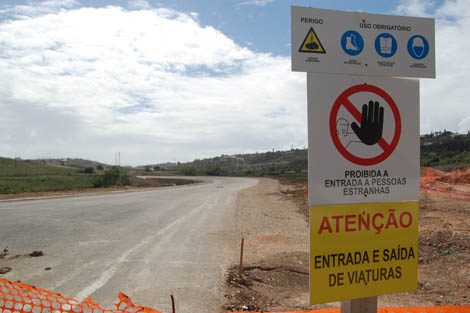 The president of AMAL – Algarve Intermunicipal Community Jorge Botelho considered "a shame" that the requalification of the EN125 has been left out of the priority investments in infrastructure of the Government for 2014.
The president of AMAL – Algarve Intermunicipal Community Jorge Botelho considered "a shame" that the requalification of the EN125 has been left out of the priority investments in infrastructure of the Government for 2014.
At issue, the fact that this work is not among the 30 priority public works projects identified by the High Value Infrastructure Working Groupr, created by the Government.
Although it is already known that there is no money in the next Community Support Framework to finance roads in the Algarve, Jorge Botelho defended that the Government will have to find funds to complete the EN125, even if only by “a differentiating route from National Funds”.
“If there is no money in the Community Funds, the Government will have to resolve this issue in another way. Because, if not, we will no longer have the capacity to be the great economic engine in the area of Tourism", he considered, recalling recent statistics that show that the region is responsible for "35 percent of tourist overnight stays" at national level.
 “If we don't want to lose this goose that lays the golden eggs, we have to retrain the nets, or the tourists come here, they see that this is not good and they won't come back. We can't be working, on the one hand, and throwing success out the window, on the other», warned the also mayor of Tavira.
“If we don't want to lose this goose that lays the golden eggs, we have to retrain the nets, or the tourists come here, they see that this is not good and they won't come back. We can't be working, on the one hand, and throwing success out the window, on the other», warned the also mayor of Tavira.
Jorge Botelho was the guest of this week's radio program «Impressões», organized jointly by Sul Informação and by Rádio Universitária do Algarve RUA FM. The interview aired this Wednesday and can be heard in its entirety on Saturday, at 12 noon, on 102.7 FM or on the RUA FM website.
In this conversation, in addition to the challenges faced by local authorities in the region and Tavira, in particular, in the coming years, Jorge Botelho took the opportunity to make it clear that he does not accept that the works on the EN 125 should be postponed indefinitely.
«We have a Via do Infante where no one passes (…) and an EN 125 where everyone passes. And with the floor deteriorating every day, with accesses and viaducts unfinished, it seems that this is no longer Portugal and became only for two months [in the summer] This is profoundly wrong», he considered.
 “The work [on the EN 125] has stopped and should have been completed since 2012. This Algarve cannot be just two months on the beach and the Government must have the idea that seasonality has to be fought. And this is often done with the requalification of structural and fundamental infrastructure for the region», he added.
“The work [on the EN 125] has stopped and should have been completed since 2012. This Algarve cannot be just two months on the beach and the Government must have the idea that seasonality has to be fought. And this is often done with the requalification of structural and fundamental infrastructure for the region», he added.
«On the report of the structuring axes, it seems to me that the railroad and the electrification of the Linha do Sul are being addressed. Now, the type of railroad has to be defined. Lighter? More modular? More intermodal? What kind of railway?” he asked.
«Because, if it is to adapt the trains we have now, when there are lands, such as Loulé and Albufeira, where the stations are four or five kilometers away, I don't know if that will do», he believes. “It seems to me that, these days, the best solution would be a lighter solution [such as a surface meter]. But that is a matter to be defined,” he added.
As for the application of community funds, an issue that was discussed earlier this week among the local authorities and other living forces in the region with minister Poiares Maduro, Jorge Botelho recalled that «this is a work that is just beginning».
«The Partnership Agreement has now been delivered in Brussels, we are still defining the thematic axes here for the Algarve, although many come formatted from Brussels. Now, we have to see what the reality is, but we hope that by September everything will be clear», he said.
In the period of European funding that runs from 2014 to 2020, inter-municipality will be valued, that is, AMAL and other associations of existing municipalities in the Algarve will have an important role.
«Alone it will also be possible, but it will be easier together, even because of the financial difficulties that many municipalities are going through. Together, we will be able to develop anchor projects for the region, in which each of the municipalities will be able to complete their share of responsibility», he believes.

















Comments